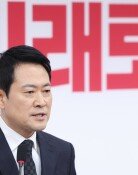OECD criticizes S. Korea’s science and technology policies
OECD criticizes S. Korea’s science and technology policies
Posted August. 04, 2023 07:58,
Updated August. 04, 2023 07:58
In a recent review of South Korea’s innovation policies, the OECD has raised concerns about the country’s science and technology approach. In the report, the OECD stated that the Korean government is addressing arising problems and emerging priorities by “reallocating and reshuffling funding rather than developing a coherent and holistic R&I policy,” criticizing that the government is failing to come up with a grand vision for the innovation of science and technology and is merely operating at a granular level.
The 307-page long report points out a lack of mid- to long-term plans encompassing science and technology and economic development as the country’s major weakness. The Korean government neither presents a clear blueprint for the future nor carries out cross-ministerial coordination, such as between the Ministry of Science and ICT and the Ministry of Economy and Finance. The report also pointed out that the R&D spending in the private sector is heavily concentrated within industrial conglomerates (‘chaebols’) and the manufacturing industry, and that support for SMEs and the services industry appears to be less effective.
Korea’s gross domestic expenditure on R&D represents 4.93 percent of GDP, amounting to 30.7 trillion won, having the second-highest R&D intensity among OECD countries. However, this massive budgetary spending does not translate into innovation in science and technology and productivity growth in high-value-added service sectors. The OECD’s criticism is particularly worth listening to, considering the country’s deeply entrenched problems with respect to the execution of R&D expenditures, such as the division of tasks among participating ministries, budgetary competitions, and short-term focus on outcomes only, which thereby hinders budget efficiency.
The development of high-tech industries such as artificial intelligence (AI), quantum computing, bio-engineering, and aerospace requires large-scale, consolidated investment. In an era of intense state-level competition, individual research institutes or firms cannot compete effectively on their own. In this regard, it becomes imperative for South Korea to focus its R&D spending on developing core technologies by selecting a specific area of concentration and putting forth all-out efforts. However, this would require a clear government-led strategic framework that encompasses both technological development and economic growth.
While the government has taken steps to review related budgets with the aim of breaking the so-called “R&D cartel” in the science and technology sector, the priority should be for the government, as the entity responsible for budgetary allocation, to set clear goals and policy visions. This involves moving beyond reactive responses to pending issues and instead establishing a long-term strategy that elevates South Korea’s science and technology landscape to new heights. The OECD’s warnings serve as a wake-up call for South Korea, which remains a fast follower rather than a leader in key technology sectors, to overcome its risk-averse tendencies when embarking on new research.




![[속보]이스라엘 “이란 공격” 국가비상사태 선포…테헤란 폭발음](https://dimg.donga.com/c/138/175/90/1/wps/NEWS/IMAGE/2026/02/28/133440981.1.gif)


